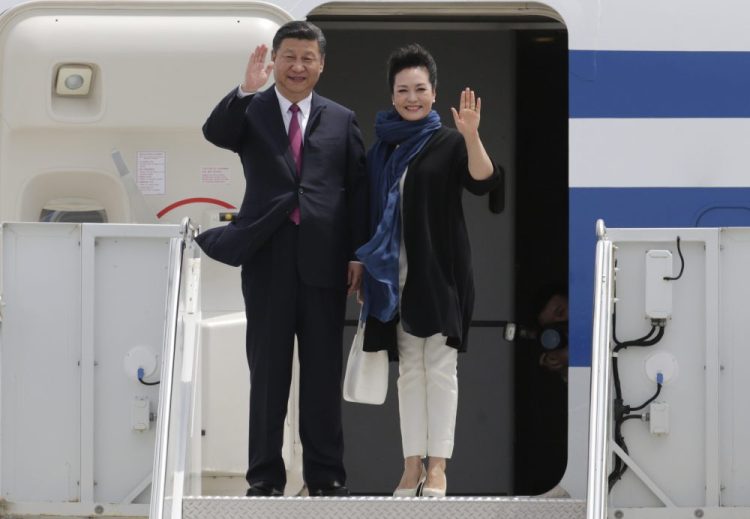BEIJING — The Donald Trump-Xi Jinping summit was off to a good start: Xi nailed the handshake. Trump cracked a self-deprecating joke. And they dined on pan-seared Dover sole with champagne sauce and dry aged New York strip steak, not the Big Mac that Trump once vowed to serve.
But as Presidents Trump and Xi scooped sorbet and sipped wine ahead of high-stakes talks on North Korea, trade and other issues, the U.S. military fired 59 missiles at a Syrian airfield in retaliation for a recent chemical attack that killed scores of civilians. It was the first direct American assault on the government of President Bashar Assad since the outbreak of the war – an assault that could shape the future of the conflict and will certainly shape the summit.
China does not want the U.S. military taking unilateral action in Syria. Beijing has long said it prefers a multilateral approach, though, over the course of six brutal years of war it has repeatedly used its veto power to vote with Russia against United Nation Security Council resolutions on Syria, including a December 2016 plans for a 7-day ceasefire in Aleppo and more, recently, a call for sanctions over the use of chemical weapons.
At a daily press briefing on Friday, Hua Chunying, a spokesperson for the Chinese Foreign Ministry reiterated China’s support for a “political settlement” and said it was urgent to prevent any further deterioration of the situation in Syria.
The timing of the U.S. strike is remarkable. The Trump-Xi summit comes at a time of tremendous uncertainty in East Asia. The Chinese and U.S. presidents already had a rather long list of things to discuss: thwarting North Korea’s nuclear weapons program, negotiating the future of U.S.-China trade, not to mention the South China Sea and Taiwan. By launching the strike while Xi is in town, Trump may have added an another item to the list.
It is not yet clear when Trump decided to launch the strike, why he chose to hit the airfield in the early hours of the morning Friday, or which countries were, or were not, informed. Whatever the circumstances or rationale, the fact that Xi was photographed shaking Trump’s hand and smiling at his declaration of “friendship” while the U.S. made a surprise military move is not going to be popular – at all.
Xi does not like surprises. Top Chinese leaders exist in a world were public appearances are tightly choreographed, the press is controlled and protocol in paramount. During the weeks of planning and negotiation that went into the Mar-a-Lago summit, every interaction and angle would have been discussed – from the handshake, to media availability, to the possibility of a rogue Trump tweet.
Given that Xi decided to attend the event, we have to assume the Chinese side was assured that things would go smoothly. But a smooth summit, from the Chinese perspective, is definitely not a summit where Xi sits through dinner apparently unaware that Trump changed course on a major foreign policy issue – or one where his presence is utterly overshadowed.
Shen Dingli, an expert on Sino-U.S. relations at Shanghai’s Fudan University, predicted that Trump and Xi would still talk about the big issues that brought them together, rather than switch the focus to Syria. Syria is not central to bilateral ties, he said, and both leaders want to tout progress on trade.
But the Chinese side must privately be wondering, “Is this a message for Xi?”
On Thursday night, conservative U.S. media painted the Syria hit as a bold but calculated warning. “He’s sending a message to the Chinese,” former general Jack Keane told Sean Hannity on Fox News.
“He’s telling the Chinese that, listen, the North Koreans are trying to weaponize intercontinental ballistic missiles and the rhetoric is they will use them against my country and my people. Don’t push me into a corner where I have to use a military option to deal with them. That would be horrific. That would mean war on the Korean peninsula,” Keane said.
“I think he’ll get the Chinese attention for sure, as a result of that. It’s not rhetoric. We’ve had rhetoric for eight years, with passivity, and no action,” he added.
Interestingly, Global Times, a Communist Party-controlled newspaper known for its nationalist tone, also saw the move as a a projection of strength. In an editorial, the paper said Trump launched the strike “to establish his authority as the U.S. president.”
“He wants to prove that he dares to do whatever Obama didn’t dare to do. While Obama hesitated, Trump’s attitude is clear,” the paper said.
“He also wants to prove to the world that he’s not a president-businessman and he will use U.S. military force without any hesitation when he thinks it is necessary.”
Send questions/comments to the editors.



Comments are no longer available on this story